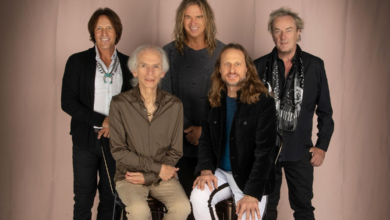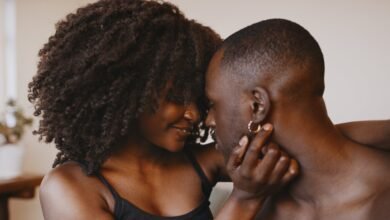I Had Horrible Financial Anxiety — Until I Quit Budgeting

[ad_1]
Bobby Lee made the news cycle last year for an interview in which he admitted to not knowing how much money he has. During a visit to “The Iced Coffee Hour” podcast, the comedian described having a “money guy” who acted as a kind of liaison between his bank account and himself. Instead of peeping at his checking account before making a big purchase, Lee just asks his money guy if he can afford, say, a new car.
“I don’t want to know how much money I have,” Lee explained. “I don’t want to live in a world where I’m like always looking in my bank account, worried and this and that. So yeah, I don’t know.” When the hosts asked if he isn’t curious about his net worth, he said no. “Because if the number’s really low, I’ll just be depressed and I’ll start panicking — like, I need to do more! Right? But if you don’t know, then I just kind of live my life.”
While I’m not as extreme as Lee — I have access to my bank accounts and check them myself at least once or twice a month — I deeply relate to his desire to know as little as possible about his financial status.
Throughout my 20s, I thought I was great with money. My proof? I thought obsessively about how I could spend less of it. The fact that what I now understand to be intense financial anxiety was a problem and not an asset was something that didn’t dawn on me until I was nearly 30.
In my miser era, I eagerly tried out every budgeting method I heard about. I tracked my spending in spreadsheets, downloaded financial apps, met with a financial coach who walked me through the envelope method, read Dave Ramsey and Suze Orman’s advice (hey, it was the early 2010s). I gave myself incremental financial goals, set up automatic transfers to keep excess money out of my checking account, participated in no-buy months.
It probably goes without saying that I abandoned each financial experiment within weeks. But I was always willing to try again.
I thought I was doing the right thing, but during this time, money made me miserable. Unexpected costs could bring me to the brink of a panic attack. And not just surprise bills. Happy costs, too: an unanticipated invitation to a wedding; my partner daydreaming aloud about taking a trip together; the idea of having a child someday. “How will I be able to afford it?” I’d ask myself.
Many experience this kind of financial stress every day. But the anxiety crushed me even when I had enough money in my checking account to cover the expense right then. I didn’t have uncommonly high debt or expenses — two huge privileges. Yet mentally, I was living like I was about to go broke, and it kept me from being able to use my financial advantage for good, to benefit myself (by putting more money in investments or letting myself take a vacation, for instance) or others (by funneling more money to charities or even just treating my friends).
Looking back, I can see that all my budgeting was a way of trying to feel a sense of control over my financial fears. What I didn’t realize then was that my attempts were actually making more more anxious, not less.
I had unrealistic expectations about what a healthy portfolio should look like, so the goals I set for myself were moving targets, rendering them unattainable. I’d fixate for half a year on building up an emergency fund, for instance, but no matter how much I squirreled away — three months of living expenses, four months, six — it never felt like enough. Or as soon as I hit my “magic number,” I’d start to obsess about my 401(k) or my lack of investments.
Because I was coming from a place of scarcity and fear, the strategies I used to try to meet the targets I set for myself always felt punishing, even when they were reasonable or gentle. The second I deviated from a plan I’d set, I’d feel shame and self-loathing. I’d struggle to get back on track, then eventually give up, berating myself for being so undisciplined.
What ultimately helped me see that I had a problem was a conversation with my partner. We were discussing the different ways we viewed money, and he said something about how he saw money as a tool, something that lets him enjoy experiences with friends and loved ones. That sounded so nice, so right. I instantly registered that I never once thought about money that way. To me, it was only a measure of security. Every dollar spent made me more vulnerable; every dollar saved made me more safe. But safe from what?
That conversation instantly changed my perspective around money, but my deeply ingrained fears didn’t go away so quickly. I wanted to begin using money the way my partner did, as a way to enhance my relationships and spread joy to others. But when it came time to actually part with cash, the same old anxieties kicked up.
While talking about the dilemma with a friend, I mentioned to her that I was currently using an intense budgeting app, one that showed me a snapshot of my net worth and encouraged me to track every cent I spent. She suggested something revolutionary: why not quit budgeting?
She saw what I couldn’t, which was that being more involved in my finances was reinforcing the scarcity mindset that was at the root of my anxieties. I never felt like I had enough money. What if I deleted the app and went about my life, checking in on my bank accounts once or twice a month to make sure I had enough to pay my bills, and seeing how I spent when I wasn’t obsessively tracking my every transaction?
At first, it felt wrong. All the financial advice I consumed seemed to suggest that keeping closer tabs on your spending was better. I would be going about my business when the familiar old fear would clench at my heart and I’d think, “What if my bank account is empty right now?”
It never was. The truth is, I spent about the same when I was tracking my purchases as when I wasn’t. I began to learn that I didn’t need to be so involved in my accounts; on a day-to-day basis, I could trust my instincts around when I could splash out a little and when it was time to tighten my belt. And if I ever went a little overboard, one or two check-ins a month was enough for me to spot the trend and course correct with plenty of time to help keep me out of bankruptcy.
It’s important to point out that I was able to try this strategy because I wasn’t living with the burden of uncommonly high debts or expenses, and I knew my income covered my living expenses with some room to breathe; as a result, I already had a bit of cushion in my bank account, a situation that isn’t the reality for many.
Thirty-eight percent of US adults have $100 or less in their checking account, and 36 percent have $100 or less in their saving account, according to a GOBankingRates survey of more than 1,000 people across the country. Being able to live without financial uncertainty — and therefore being able to take a less-involved approach to my money — is a huge privilege, and one that’s not realistic for everyone.
There have been times when I’ve had to sit down and take a hard look at my finances and make some changes in my spending habits because I was about to shoulder a large expense (a wedding) or because my financial situation was about to dramatically change (having a child). I don’t ignore my expenses and income, but I now try to take a macro approach, rather than a micro one.
I think of my current strategy as intuitive budgeting. Just as many people find calorie tracking to be unhelpful and even unhealthy, and instead strive to practice intuitive eating, rigorous financial tracking just doesn’t work for me.
The biggest measure of success for me was that quitting budgeting enabled me to spend more money on other people.
In the book “Happy Money,” author Ken Honda talks about the concept of money as energy. Money is emotional, he says, and it has the ability to spread positivity or negativity, depending on the giver. When you give money from a place of love or happiness, it spreads love and happiness. But when you give from a place of fear or sadness, it spreads those traits.
When I first read the inside flap of his book, the concept made sense to me immediately. All my life, I’d been spreading stressed, afraid, unhappy money. By lessening my own financial anxiety, quitting budgeting allowed me to give more generously and hopefully spread happy money instead.
Quitting budgeting isn’t for everyone. Many people need to keep closer tabs on their accounts or just want to because they feel empowered by keeping a tighter rein on their spending. But every time I’ve tried to return to budgeting, my anxiety comes with it. So while I probably won’t hire a “money guy” like Bobby Lee any time soon, you won’t catch me keeping a banking app on my home screen either.




